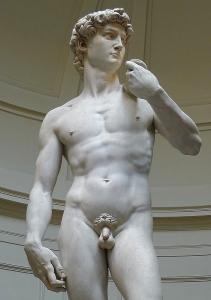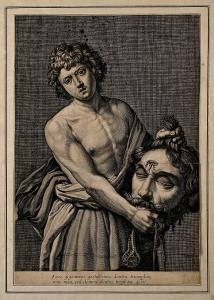 I was for a long time vastly disappointed in this chapter of the long saga of Samuel, Saul, and David. The tale has up to now been rich and rare, filled with irony and ambiguity, giving it a timeless and immediately relevant quality that simply never grows old. And the material following the chapter resumes this high quality of story-telling worthy of any great tale from the ancient or modern world. But chapter 7? It appears to be raw and pitiful propaganda in its most base form. Just what should a modern narrator do with stuff like this? In my own understanding I saw it as “a word from our sponsor.” The fact is that the promises of a “sure house for David,” portrayed in this chapter, have in fact come to pass. After the death of David, his son Solomon builds the temple in Jerusalem, a project that David first imagined for himself, and all succeeding rulers over Judah are direct descendants of David, save the outlier, and impossibly evil, queen Athaliah. Chapter 7 is thus predictor of what is to come, though its composition surely occurred long after many of its “predicted” events have occurred. When a fabled monarch of the past has become the epitome of what it means to be a monarch of Israel, it always falls to some purveyor of propaganda to tell a wildly hyperbolic story about that leader to ensure that his memory will always be golden and untarnished. That seemed to be the role of chapter 7.
I was for a long time vastly disappointed in this chapter of the long saga of Samuel, Saul, and David. The tale has up to now been rich and rare, filled with irony and ambiguity, giving it a timeless and immediately relevant quality that simply never grows old. And the material following the chapter resumes this high quality of story-telling worthy of any great tale from the ancient or modern world. But chapter 7? It appears to be raw and pitiful propaganda in its most base form. Just what should a modern narrator do with stuff like this? In my own understanding I saw it as “a word from our sponsor.” The fact is that the promises of a “sure house for David,” portrayed in this chapter, have in fact come to pass. After the death of David, his son Solomon builds the temple in Jerusalem, a project that David first imagined for himself, and all succeeding rulers over Judah are direct descendants of David, save the outlier, and impossibly evil, queen Athaliah. Chapter 7 is thus predictor of what is to come, though its composition surely occurred long after many of its “predicted” events have occurred. When a fabled monarch of the past has become the epitome of what it means to be a monarch of Israel, it always falls to some purveyor of propaganda to tell a wildly hyperbolic story about that leader to ensure that his memory will always be golden and untarnished. That seemed to be the role of chapter 7.
However, I suppose it could be said that if this propagandist imagined that his glowing portrait of the fabled David would serve to cleanse his life for all time, not unlike the later work of the even more propagandistic Chronicler, he was unfortunately mistaken; the better narrator of the king’s life, the one more sensitive to his foibles and weaknesses, continued his quite raucous story of David, culminating in his appalling affair with Bathsheba, his murder of her husband Uriah, and his bold-faced lie about the whole thing. Not to mention his cold and lonely death as a feeble old man, muttering cruel Mafioso-like contracts on helpless enemies just before he makes his way to Sheol! I wonder whether the author of chapter 7 knew the rest of the story? If he did, his attempt to “clean it all up” was a rank failure, and for that failure I am very glad. The loss of the longer literary history of David would have been grievous indeed.
Still, having said all that, having derided the writer of chapter 7, when viewed in the glaring light of the far longer tale, it might be said that chapter 7 is another example, as if any more were needed, that David is a narcissistic and thoroughly self-absorbed person. Listening to David’s language in this chapter with the richer picture of David in mind, could make his desire for a temple and his subsequent response to Nathan’s admonitions nothing less than more of the same, nothing less than David thinking almost exclusively about David and his legacy. In that light, the propaganda goals of chapter 7 are muted, and the “true” David speaks still. Let us see if that might be a possible way to hear this part of the David story.
David felt for the first time in his warrior’s life at least close to safe and secure. His splendid palace, built for him by the rich Tyrian king, Hiram, and his skilled architects and builders, made the new monarch of all Israel, and his capital city Jerusalem, the potential envy of the world. But somehow he needed something else to complete the picture. No capital could be without a temple, without a house for the God who had chosen this people for greatness, not to mention their king. “How can I sit comfortably in this splendid house of sweet-smelling cedar while the Holy Ark of YHWH, that wonderfully mysterious chest, that I have brought into the city, find its place only in the Tent of Meeting, the movable tabernacle that accompanied the wandering Israelites through the blasted wilderness so long ago? Nathan, my faithful priest, we must build a suitable house to honor the Holy Ark. Draw up immediate plans; we must not delay!” As the king spoke these words, he thought to himself that a magnificent temple would be just the thing to increase the glory of the City of David, not to mention the glory of the king himself. But these thoughts he did not utter aloud to the eager Nathan, who rushed from the audience chamber to fulfill the king’s and his own desire for a temple for YHWH.
Unfortunately, that night the High Priest was troubled by very disturbing dreams. YHWH, the God, came to Nathan with strict orders for the would-be temple builders. “Tell David I want no such thing from him! When have I ever asked anyone to build for me a permanent structure for my so-called dwelling place? I am a God on the move, as your own long history with me reveals, if you are clever enough to listen to it! Nathan, remind David that I took him from sheepfold to palace, to be a prince over my people, Israel. Remind him that I have always been with him, giving him victory over his enemies, and finally rest and security in his own city. Tell him that the days of his tribulations and struggles are over; I will now make for him a great name, just as I made the name of Abram great, as I have made and will make other names great in my earth. I want no house of cedar from him, but I will make him a great house. Tell him that after he dies, I will raise up from his house offspring who will follow, the first of which will build a temple for me, and whose dynasty will never end in Israel.
Now, tell him, too, Nathan, that when he sins—which he is sure to do—I will punish him with my rod, just as mortals do. However, I will never remove my unbreakable love from him or his offspring as I did with that first king Saul. Make it plain, Nathan: Your house and your kingdom shall be made sure forever before me; your throne shall be established forever.” And with that astonishing pronouncement, YHWH ceased speaking, and Nathan awoke and rushed to tell David the news.
“No temple, huh?” mused David. “Exactly, my Lord,” replied Nathan, “but YHWH said directly that your house, your dynasty, will last forever. Surely, King David, that is gift enough from your God!” “Indeed,” muttered David, as he attempted to understand what his priest had said. Then the king, who was ever decisive in his words and actions, led Nathan to the tent of meeting, and stationing himself in front of the Holy Ark, began to pray. “Now, O YHWH God, you are God, and your words are always true, and you have promised this good thing to your servant; now therefore may it please you to bless the house of your servant, so that it may continue forever before you. For you, YHWH God, have spoken, and with your blessing shall the house of your servant be blessed forever.”
It was a prayer most carefully uttered. It began with gratitude for all that YHWH had done for David, but it ended with the demand that since YHWH had spoken of David’s eternal dynasty, and because YHWH’s words were always fully truthful, that YHWH shall bless David’s house for all time. David did not speak in supplication that YHWH might do this for him; David said as clearly as he could that YHWH was now obligated to fulfill his spoken promise, and David expected nothing less than its full implementation for him and for all his dynasty to follow.
And David stood up and gazed at the Ark and knew that YHWH had spoken a great thing this day. David and his name were now secure forever in Israel, and a satisfied smile creased the king’s face. From shepherd to king! His awesome majesty would never be diminished or compromised. Though he and his descendants might fall into sin— however trivial and easily forgotten—YHWH would love them all forever. If he had ever doubted YHWH’s choice of him, or his own greatness, those doubts were gone. He was free of all doubts now; he was king and could do whatever a king wished to do! His smile turned into a small squeal, and finally erupted into a loud shout of joy.
And so began David’s horrifying and ignominious downfall, through adultery and murder and a lonely death.
(Images from Wikimedia Commons)











